They say “money makes the world go around,” but the C programming language actually does.
C is a core foundation in building up the IT and electronics industries for 50 years. With it, a developer can build their own operating system or application system. This means skilled C developers are extremely versatile employees, but how do you snag the right one?
There are so many different programming languages that asking the right C interview questions is crucial. After all, you don’t want to settle with a web programmer that doesn’t understand dynamic memory allocation of functions in C, right?
In this article, we’ll cover:
- the basics of C programming language and where it is used
- some of the best C interview questions to ask
- other skills testing methods you can use to screen candidates’ skills
And while you don’t need to understand a dynamic memory allocation or void pointer, the ideal applicant should.
The basics of C programming language: what is it, and where is it used?
C – registered as ISO/IEC 9899:2018 – was developed in 1972 by Dennis Ritchie as a general-purpose and middle-level language, which became an architectural pillar in shaping computing.
The advent of C was a revolution that eventually led to the creation of other general-use languages, like Python and PHP.
C programming language is used to create and maintain protocol stacks, operating systems, device drivers, and more. In fact, you’ll find the use of C in large server farms (cloud computing setups) to the smallest of embedded systems (watches and Raspberry Pi). And the language is also very easy to write and understand.
The C language also has a very similar syntax to other programming languages. If a programmer can program in C, there’s an excellent chance they can easily pick up a range of other languages, making them a versatile candidate.

This is essential if the organization or project you are hiring before decided to pivot to another software stack. We recommend asking the candidate how they handle project changes.
Large communities are centered around programming in C, so your organization won’t struggle with too few applicants applying for the position.
With such a thriving community and online resources, don’t be surprised if candidates come over-prepared to answer your C programming interview questions.
What’s the difference between C, C#, and C++?
You’ve probably already heard of these three C-letter programming languages but might be unsure about their differences. After all, they’re all just variations of C, right? Surely, they’re interchangeable.
Well, not exactly.
While C is great for developing operating systems and hardware, C++ is about systems and applications because of its object-orientated nature. The biggest draw of C++ is the resource structures, its use in creating performance-critical applications, and the control it allows the programmer.
However, C++ is more difficult to learn than C, but any C code is valid C++ code – a specialist in the latter could ace a C interview.
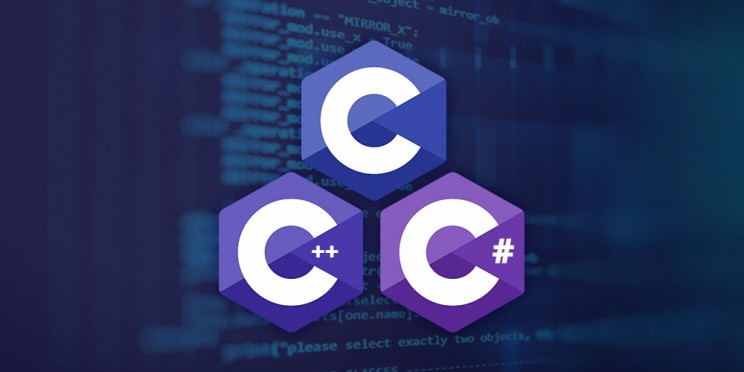
And then we come to C#. Microsoft developed it for use in creating applications and web development.
Unlike C, it’s a scalable language that can be used for small mobile apps, and console games, and doesn’t require. header file. Some developers use it as an alternative to Java.
Beyond the Programming Language: the skills to look for in a C developer
Besides understanding the differences between C++, C#, and the C programming language, the ideal developer candidate must understand these fundamentals of C.
It’s vital to include these in the C programming interview questions.
1. Experience with socket programming
To over-simplify, socket programming is when two nodes on a network can talk to each other. It’s a vital part of network application operations and development.
When hiring for a C developer, there’s a good chance the role will include some form of node interaction.
Writing the backend for a fintech network system, as an example, may require a change to data structure or data types and high-level system programming.
2. Good understanding of data structures and algorithms
These may be complicated and unnecessary in a developer’s everyday life but are crucial when structuring scripts that call global variables and main functions.
It shows that the candidate can solve problems – you’ll want to ask the candidate to explain what a binary search algorithm is.
They also need to comprehend how a C program is laid out, how to implement a header file, and call by reference, for example.
3. Ability to identify and solve bottlenecks
When a project or task comes to a standstill, it can be because of the tiniest detail. The developer needs to be able to understand where issues can arise in using C code, like memory leaks and inaccurate memory allocation.
Thankfully, diagnosing problems with C can be relatively easy compared to C++, but does the candidate know that?
4. Strong interpersonal skills
The ideal candidate will have excellent written and verbal communication skills and can collaborate and adapt to sudden changes within the project or workflow.
5. Experience writing technical documentation
Technical documentation is a crucial part of programming. Even if the candidate isn’t a technical writer – or interviewing for that position – they have to be able to document the source code they are working on, changes they’ve made, or updates that have been pushed.
They also need to be able to understand general technical writing, explain when a header file is included, and create small programs to print hello world to test systems.
You should test the candidate’s ability to document code with a few of your C programming interview questions.
6. The ability to work remotely
More companies are offering remote and hybrid working as a perk to acquire the best talent, but the staff has to handle working outside of the office. Assessing the candidate’s ability to self-motivate, work asynchronously and stay engaged with the business will help you select the best person for the job.
5 basic C interview questions to ask
Hiring a developer can be a daunting task. As we mentioned earlier, you will likely receive many applications for C developers.
To kick off the process, each of these questions will help you gauge the general competence of the applicant while subtly testing some of their coding knowledge during the initial call.
Top 5 Go-To Interview Questions:
1. Which programming languages do you work with?
2. What is your favorite IDE?
3. Would you use C to develop web applications?
4. How do you note areas of interest in a C file?
5. Have you ever built a stand-alone C program?
60 important C programming interview questions to ask
Once you’re happy with the first few answers, it’s time to test the candidate’s in-depth knowledge of C.
60 of the most important C programming interview questions:
1. What do you think is the role of a C programmer?
2. What is C known as the mother language? (This is one of the most commonly asked C programming interview questions.)
3. Why is C a mid-level programming language?
4. What are the features of the C language?
5. What are some of the limitations of C?
6. What is modular programming and can it be used when creating a C program?
7. What is the function of printf?
8. Name 3 of the basic data types associated with C
9. What file extension is used when creating header files?
10. What is the process to generate random numbers?
11. When would you use = = and = = = in C?
12. What is a memory leak?
13. What is a static memory location?
14. How is dynamic memory allocation used?
15. Does C have Classes and Objects?
16. What is an array in the C language?
17. What is a pointer variable in a C program?
18. What is a dangling pointer in C?
19. Give an example of when you would use a dangling pointer.
20. What is int short for and how is it used in the C language?
21. Is it possible to compile a program without the main function?
22. Do arrays in C use static or dynamic memory allocation?
23. What is the function of “Call by reference”?
24. Which other programming languages are comparable to C?
25. Does a void pointer have any association type?
26. Which basic datatypes are supported in the C language?
27. What is the difference between calloc() and malloc() memory allocation?
28. How are the “call by value” and “call by reference” different from each other?
29. What is a token used for in the C language?
30. Do programs written in the C language need to be compiled?
31. What are some of the header file names?
32. How do you swap numbers with the “call by reference”?
33. What are reserved keywords and how many are there?
34. What is the role of a protected access specifier?
35. What is the external storage specifier?
36. What is the delete specifier?
37. Is it possible to write a “Hello World” application without using printf?
38. When would a registered keyword be used?
39. How are actual parameters different from formal parameters?
40. What is the self-referential structure, and can you create one?
41. What are bit fields?
42. How do you call a file with a C program?
43. What is recursion?
44. Write a program to print π to 8 decimal places.
45. What is the difference between getch() and getche() functions?
46. What is typecasting?
47. What is the #undef preprocessor?
48. Can you differentiate between the macros and the functions?
49. What do you know about the evolution of the C language?
50. Is it possible to recover the source code of a compiled C program?
51. Change an intiger into a dangling pointer.
52. What is the explanation for prototype function in C?
53. Is there a built-in function in C that can be used for sorting data?
54. Which of these is a valid header file? stdio.h or studio.header
55. Does dynamic memory allocation have a maximum value?
56. Define the process of an escape sequence.
57. What is the difference between printf and scanf?
58. Can you clearly illustrate a dangling pointer?
59. Give an example of the call by value method.
60. Does this piece of code include a pointer variable, function, dangling pointer, and memory location? (show candidates a piece of code when asking this question!)
Great interviews are enlightening, but they’re not enough
It’s nearly impossible to ask all of these questions and manually screen the skills of a large volume of applicants.
On the other hand, a role-specific coding test can help you streamline the interview process and simplify candidate selection by identifying the right candidate for the job. Learn more about using online coding tests:
8 Situational Judgment or Behavioral Questions to Ask when Interviewing a C developer
The interview pipeline isn’t just about C programming inter questions, asking what a register storage specifier is, or the difference between printf and scanf.
Situational judgment interview questions present candidates with hypothetical situations. These are used to gauge how the candidate will handle various challenges at work and as a part of a team.
8 Go-To Interview questions :
1. How do you handle teammates in a project who aren’t communicating?
2. If you made a mistake that no one else noticed, how would you fix it?
3. What is your greatest failure and why?
4. How do you handle tight deadlines?
5. What are your long-term plans?
6. When given a task you aren’t familiar with, how do you handle it?
7. What is your learning process for new languages and systems?
8. What are your first steps when tasked with a new project?
3 other evaluation methods to help you assess C developers
The candidate may have absolutely aced the verbal part of the interview questions, but you need to see their work in action. And that brings us to skills assessments.
#1 – Start with the essential “Hello World” test
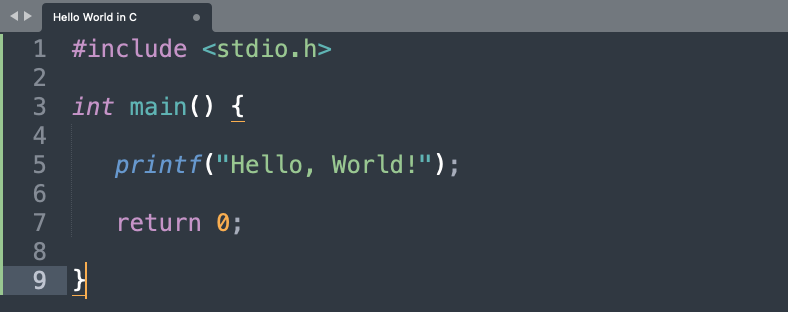
The most common way to test a candidate’s competency in the c programming language is to set up a Hello World online coding assessment.
It’s a simple exercise that consists of five lines of code – they won’t need to write a massive program. The end result is a simple line of text that reads “Hello world.”
Although a basic exercise, it can help you efficiently screen out unqualified candidates at the start of the hiring process.
We recommend setting this up as a Custom question in one of our C programming assessment tests. You can choose between a multiple choice with variations on the code or have the candidate write code from scratch.
#2 – Get candidates to write an input-output program
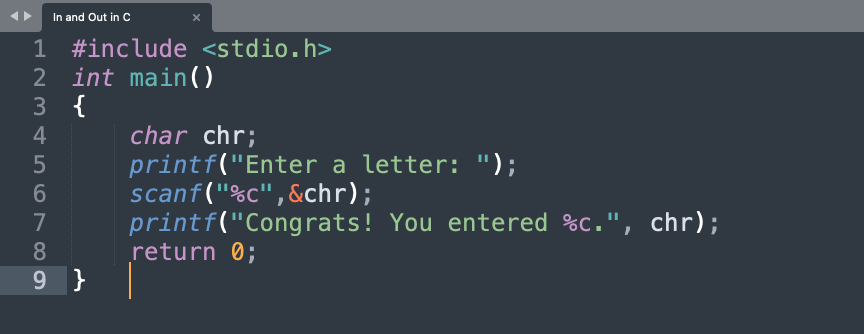
Next, you should test if the candidate can create an input and output program (with a working header file, of course). This is another simple way to test programming competency that isn’t easily ascertained with simple C programming interview questions.
This can be built on later in the interview process to further understand the candidate’s capabilities.
This could also work as a take-home task. For a coding challenge, you can ask candidates to write an additional program with a static variable that states the address of a variable, memory location, and incorporates various data types.
#3 – Create a role-specific hiring flow with bite-sized assessments
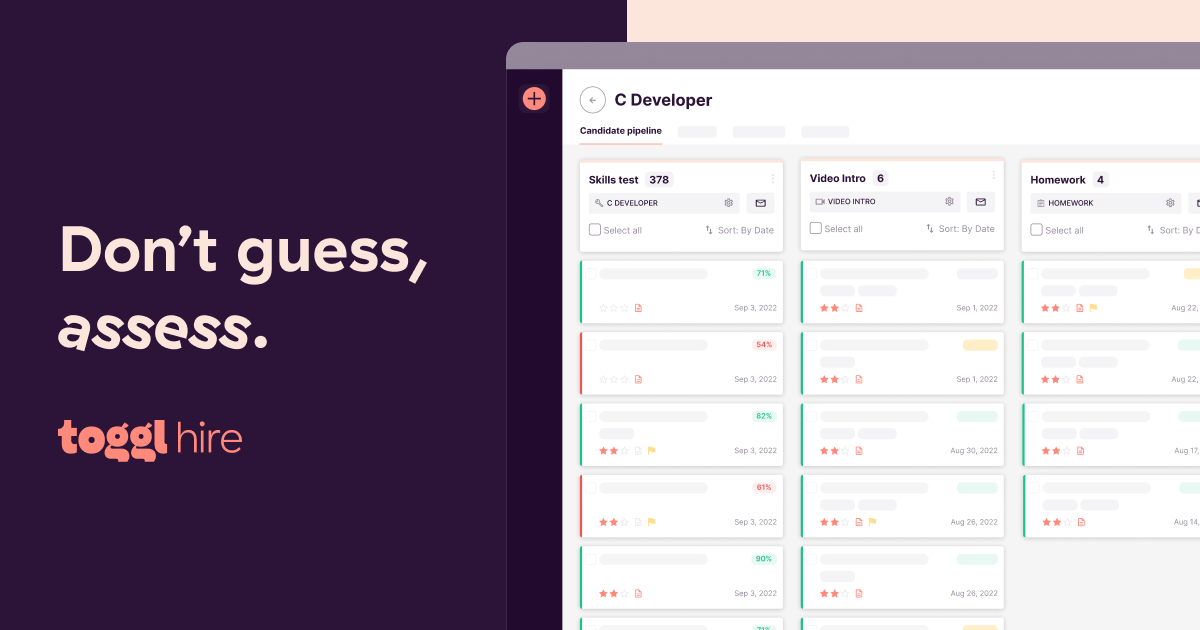
Hiring great developers is hard. Interview questions and answers can shed some light on the candidate’s experience and way of thinking, but you won’t know what they’re capable of until the rubber hits the road.
At Toggl Hire, we’re big on skills over resumes; or great interviewing skills over practical abilities. So we developed a data-driven hiring process that favours candidates with the right skillset.
To respect candidates’ time and effort, we suggest breaking your hiring process into smaller milestones. Here’s the process we use to hire top-class developers for our team:
- Application via a basic skills screening test – 15 minutes
- Screening critical soft skills via asynchronous Video Intros – 15-20 minutes
- Qualifying interview with the hiring manager – 1 hour
- Homework assignment to evaluate coding skills – 2 hours max
- Paid project to evaluate team and technical fit – 2,5-3 days
- Final presentation interview with key stakeholders – 1 hour
At every step of the process, you select the best candidates to move forward and inform the rest. It’s efficient, reliable, and kind to everyone involved.
Access our library of tests with interview questions and answers
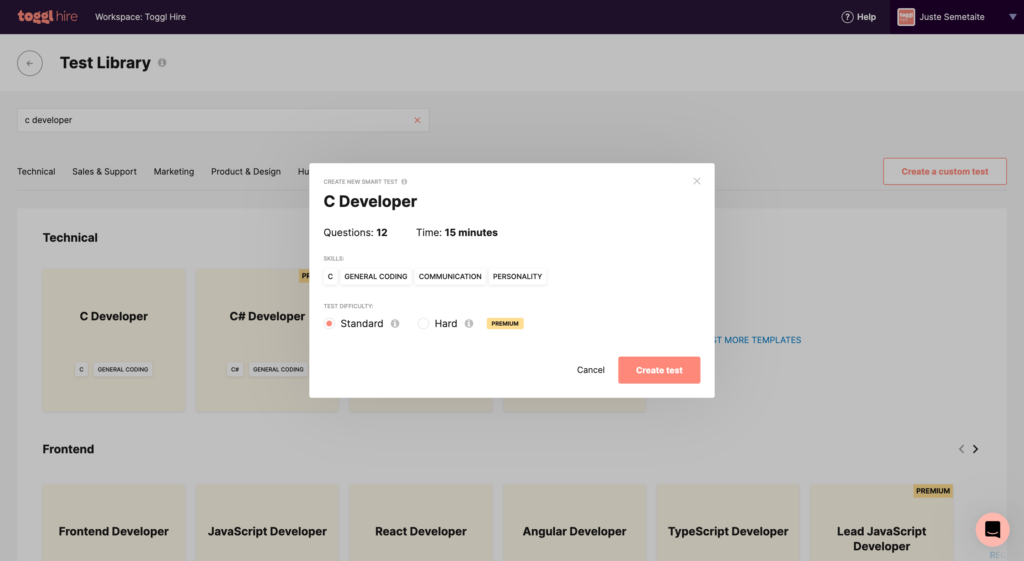
Are you ready to use the best C programming interview questions to hire your next C developer? The first Job (which includes 5 different tests) is free! You can get started in minutes with a library of pre-built assessments for various programming languages.
Check out our Test Library to learn more about the C Developer skills test.
Juste loves investigating through writing. A copywriter by trade, she spent the last ten years in startups, telling stories and building marketing teams. She works at Toggl Hire and writes about how businesses can recruit really great people.



